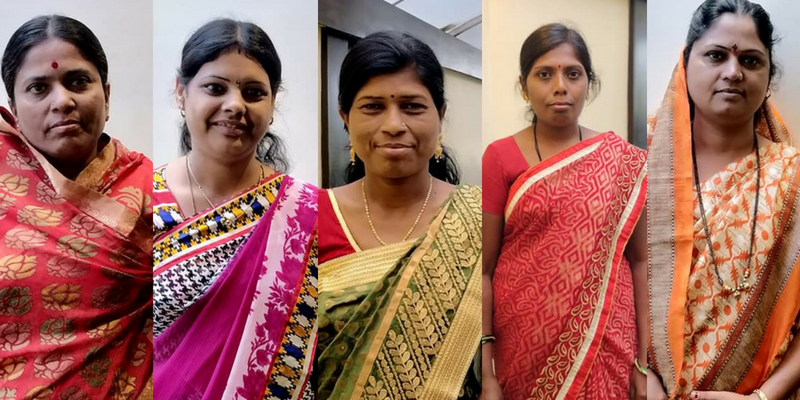In Maharashtra’s drought-hit region, these 5 women entrepreneurs are reaping the rich harvest of success
Backed by Swayam Shikshan Prayog, these five women have taken to entrepreneurship, be it organic farming or rearing an indigenous breed of poultry.
In the parched and cracked lands of Marathwada region, where water, land, and income are scarce, a few women have braved the odds. Mentored and supported by Pune-based NGO Swayam Shikshan Prayog, these women are using newer farming techniques to earn a living and charting inspiring tales of success.
But it wasn’t easy.
In January this year, the perennially drought-plagued area once again stared at water scarcity. The region is spread across 64,525 square kilometres, of which 57 lakh hectares of land is suitable for agriculture. But as many as 3,500 villages here recorded low yield.
The region is home to eight districts of the region - Aurangabad, Jalna, Parbhani, Hingoli, Beed, Nanded, Latur, and Osmanabad. All eight figure in the list of the 100 poorest districts in the country; farmers’ suicides and crop failure are common.
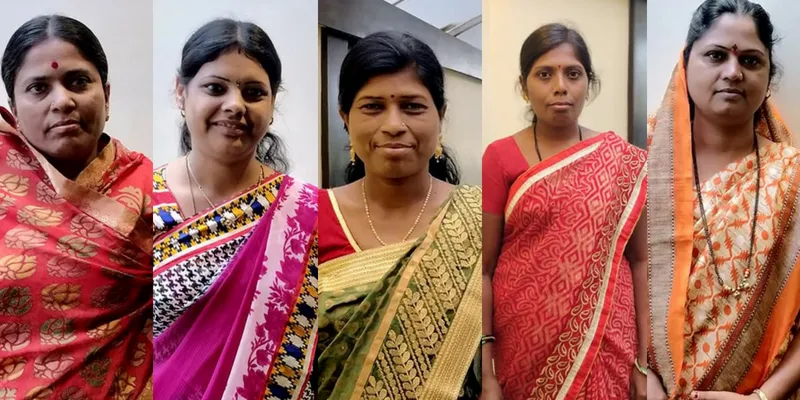
Against this backdrop, these five women stand tall with stories of hope and inspiration. We tell you more:
From 2 kg to 25 varieties
For 36-year-old Shailaja Sreekanth Narode, growing organic vegetables on her 2-acre land is a new-found passion. Her day at the farm begins at 6 am; she’s on her toes for the next 12 hours. With 25 varieties of vegetables ploughed in, she rakes in anything between Rs 5 and 6 lakh income annually.
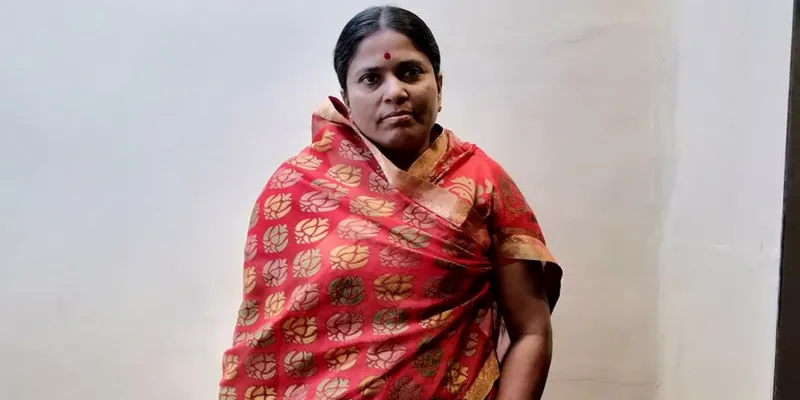
Hailing from Musla village in Osmanabad district, she started farming at the age of 25. Married into a family of farmers, her first harvest was 2 kg lady’s finger, Shailaja shares.

She says her produce was of good quality and stood out in the local farmer’s market. “Meri maal main aek alag champ thi, madam,” she reveals. With rising demand for organic vegetables in the market, she shifted her base from Osmanabad local market to Pune’s famous Gultekdi market. In the last few years, with SSP’s intervention, she sells her produce to Vijaylakshmi Producer, a local aggregator for farmers and buyers. With the aggregator’s help, her job doesn’t involve selling produce anymore; she can redirect all her energy and learnings into growing more, says Shailaja, who has three children.
"Once we have our produce ready, we pack it in wooden cartons. After the packing and labelling, they are picked from the doorstep. We are also informed about that particular day’s price in the market, so it’s easy for us to track our produce,” Shailaja adds.
Too delicate to be a farmer?
At the age of 14 years, Archana Gokul Mane’s parents married her off into a farmer’s family in Osmanabad due to their precarious financial circumstances. She was termed too fragile for farming, and left behind while the seven members of her family, including her sister-in-law and mother-in-law, joined the men on the farm.
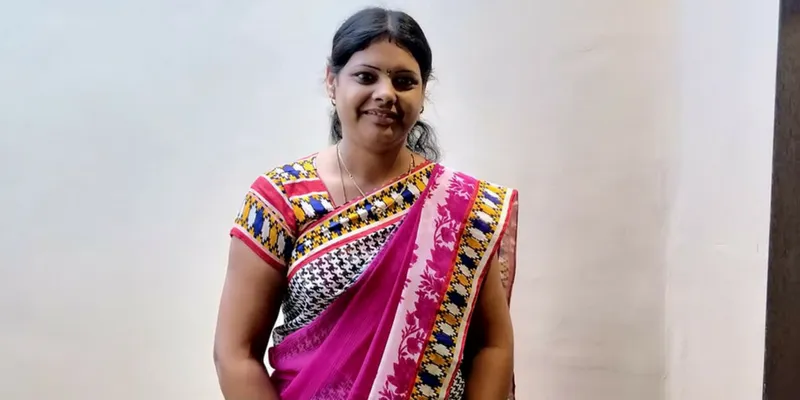
Her first child was born when she was 17 years old, she requested her husband to allow her to work and joined the SSP. Archana, who started her journey as an arogya saki and taught rural women about easier access to healthcare, today rakes in an annual income of Rs 9 lakh, courtesy organic farming.
In 2012, when Archana started farming on 0.5 acre land, it was through an investment of Rs 17,000 that she borrowed from SSP. On that small patch of land, she grew chillies, brinjals, and potatoes; she made Rs 1,43,000 in her first harvest, three months later. After seeing the turnover, her once-apprehensive husband said, “Haan, tum abhi acchi kheti kar sakti ho; I got my certificate from my husband,” she giggles.
In 2014, she started with the one-acre model, which is predominantly an agricultural model wherein more than a hundred crops are grown on a single acre of land. Archana grew her previous cycle of vegetables on the now-extended two-acre plot along with moong, toor, harbhara (chickpeas), and tomatoes. She grew marigold flowers as a cross-crop as it acts as a pest repellant. Tomatoes, the new addition, brought her an income of Rs 2,25,000 in less than three months.
Today, apart from growing vegetables, she also extends her learning to 17 different villages, training women in alternative farming techniques.
Winning a National Award
In 1999, the then one-year-old SSP conducted a gathering where they gave the women of Hinglajwadi vocational training. What started there led to a self-help group, monitored and supported by the organisation. Kamal Vishnu Kumbha, 40, was one of the women beneficiaries. After her training, Kamal started manufacturing glass bangles.
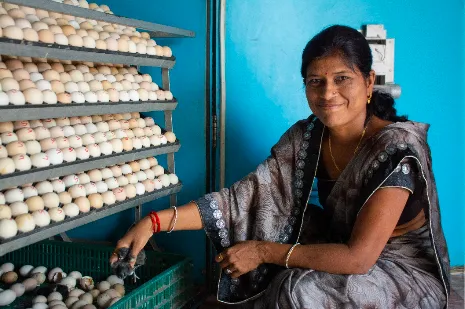
Between 2002 and 2010, she was already manufacturing seven types of bangles that were sold in local markets; she continued doing so for the next few years. In 2015, Kamal took a loan of Rs 1,40,000 and started goat farming and poultry. Hailing from a landless farming family, she leased out 5 acres of land for 10 years. Today, with an in-house hatching machine, an organic farm, a pond dedicated to fishery, and a vermi-compost manufacturing unit, Kamal rakes in an annual income of Rs 30 lakh.
In 2017, Kamal received a National Award from former president Pranab Mukherjee as a part of CII Foundation’s exercise to applaud women trailblazers.
When I returned from Delhi to Hinglajwadi, I had reporters, television, and print channels waiting for me. I felt like a celebrity, she shares.
Also a recipient of the NITI Aayog and FICCI award, which she recently received from President Ramnath Kovind, Kamal says her life has changed. That’s why she is clear she will refer every woman she knows to the SSP.
From a SHG to starting a brand
In 2011, when Revathi Sijavi Kangule was introduced to organic farming, she found it extremely fascinating. Hailing from a farming family, she could not wait to go home and share her new learnings with her family. For someone who started as a trainee in a self-help group, she today has a register that shows 3,512 women trained by her on farming techniques.
Revathi, who started her journey on the field with 3 acres, had to lease the land for 10 years at the cost of Rs 10,000 per acre. She followed the one-acre model, sowing a combination of jowar ,wheat, and moong; she then dedicated 2 acres to vegetables.
She eventually extended her 3 acres to 5 acres and added cash crops like soybean and cotton. She also makes additional income by selling bhusa (hay) in the local market in Nanded District, Kandahar Taluk.
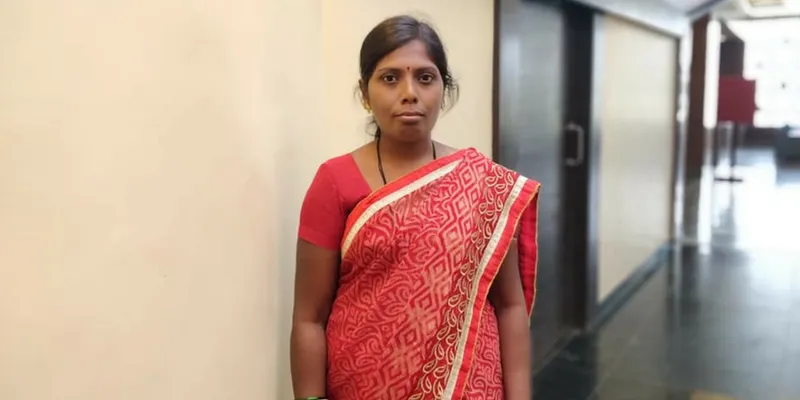
In 2013, Revathi took a loan of Rs 10,000 from SSP and started making haldi (turmeric) and chilli powder. She bought a processing machine, set up her unit, and targeted weekly village markets to sell her masalas. After understanding the semantics of selling these powders, she moved out of these small markets.
I used to put up a stall in apartment complexes and buildings in Pune and Mumbai. Most apartment associations were kind to me and this helped me set up Jai Durga Grah Mahilla Udyog. Under this manufacturing unit, I started Sakhi. Today, under this brand, I sell red chilli and turmeric powders, idli-rava batter, gram flour, and wheat flour, says the mother of three children.
To introduce her product to people and win trust, she started by giving samples and continued for more than a year. “That year we made no profit but just increased our customer base in Pune and Mumbai,” she says. A team of 20 women from Nanded district now works with Revathi. The team is split into two - 15-16 of them are involved in manufacturing; the rest are into marketing.
Gearing up for the competition
For 35-year-old Shilpa Rajesh Vibuthe, attending a session by Shyamal Tai from SSP changed her views about farming. The rich black soil of the Marathwada region, which is often preferred for growing grapes, among others, became her obvious choice.

With only one acre of land, located next to a graveyard, she started growing grapes. It has been four years since then, and now she also owns a grape nursery where small saplings are grown and sold between Rs 6 and 8 per sapling. Prices dropped last year and every sapling was sold at Rs 2-3, she says, adding that they didn’t make a profit.
Last year, she took a loan of Rs 2 lakh from SSP and bought four cows. Today, these cows produce 27-30 litres of milk every day, which is sold in the nearby dairy. The dairy farm is managed by eight labourers, and Shilpa’s huband also lends a hand.
On being asked how life has changed after SSP and on receiving support from family, she says, “Sirf mehnat se kuch nahi hota, thoda support bhi hona chahiye. Abhi competition ka zamana hai, knowledge aur finance ko ek saath chalna hoga.”
It is inspiring to note how these women, who till one point in their lives were content to stay home, have stepped out and become trailblazers.






